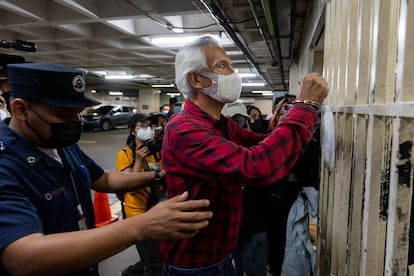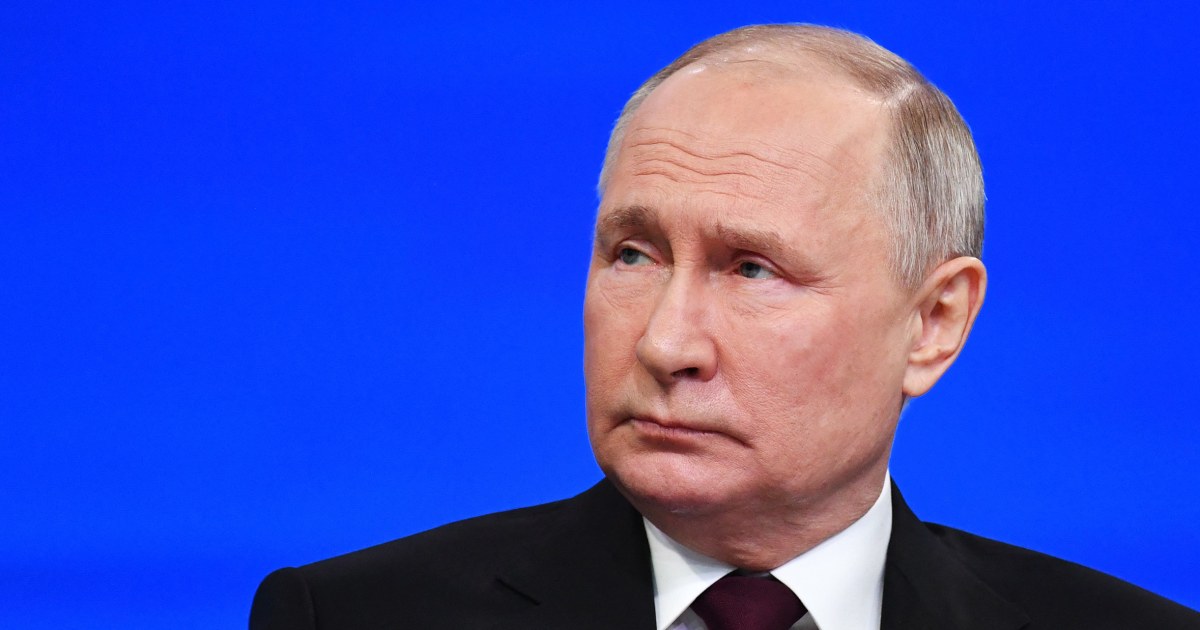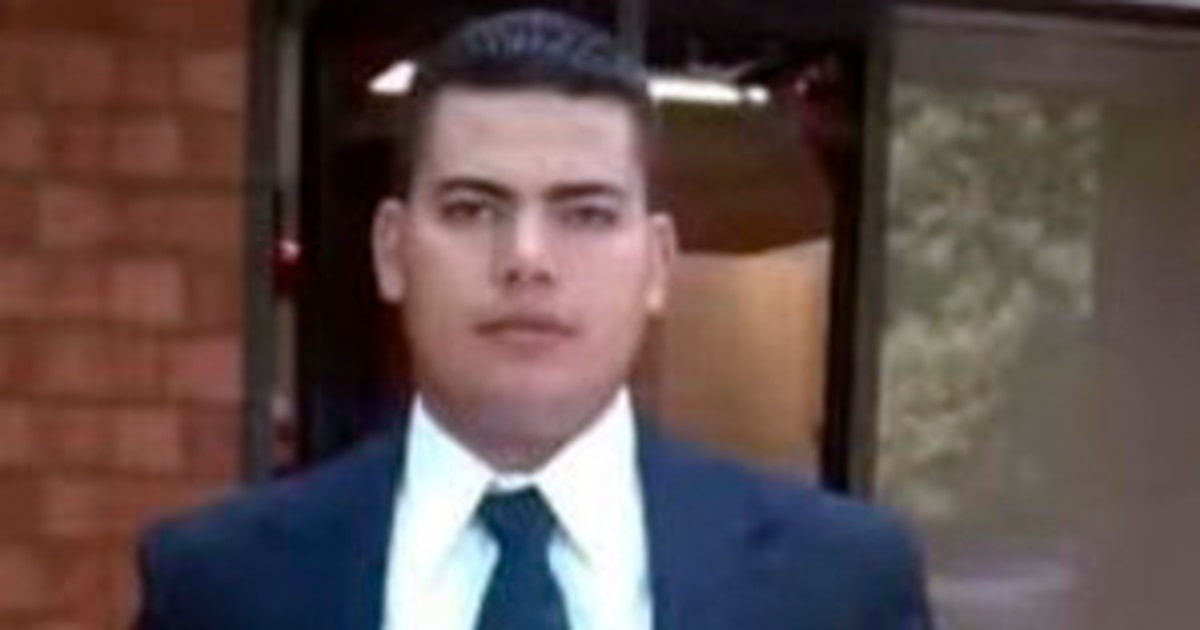Journalist José Rubén Zamora is arrested this Saturday, July 30, in Guatemala City. Moises Castillo (AP)
He wears his typical
jeans
and that shirt, already somewhat old, with red and black squares.
Dress like someone at home without fear of being disturbed.
And so, without prior notice, a family visit is interrupted by members of the National Civil Police (PNC).
It is 2:20 p.m. on Friday, July 29 in Guatemala City, and the operation, led by the Public Ministry (MP) and the Special Prosecutor against Impunity (FECI) has begun.
His first target is the house of the award-winning journalist, president and founder of
elPeriódico
, José Rubén Zamora.
But the PNC does not enter through the door, but through the roof of the house.
Shapes matter here too.
Outside, pick-up
vehicles
without license plates and with armed policemen and their faces covered are deployed all over the street of the residential complex, located in the heart of the university city.
It will be a long afternoon.
They know.
Insiders, not so much.
Zamora, in subsequent statements, narrates that his grandchildren and daughter-in-law were in his house when the PNC burst through the roof.
They had come to visit from the United States and now they were witnessing, openly, the Guatemalan reality.
But the operation also has another destination.
At 3:16 p.m.,
PNC vehicles arrive at the central offices of
elPeriódico , located on the outskirts of the city.
This is the second raid of the day against journalists from the newspaper.
Inside the offices, there are more than thirty employees.
From administrative staff to press operators.
Crossing of calls, messages and worries.
Veteran reporters can imagine what this is all about.
In 2003, the military counterintelligence leadership of the Presidential General Staff raided Zamora's residence for several hours.
On three occasions they simulated his death and made threats in the style of “don't mess with those above you”.
All for two articles published by the newspaper and signed by its president: an opinion column titled
“Ríos Montt, some notes”
;
and an investigation
“The mafia and the army”
.
But today, almost two decades later, few imagine one of the most shocking moments of the day: the image of Zamora with shackles.
At 4:02 p.m., the
elPeriódico
team, which is not at the central offices, makes the brief information public through social networks.
Two raids are taking place, one in the offices and the other in the journalist's residence.
But nothing else.
The Public Ministry is silent.
Zamora's family and the newspaper's workers remain incommunicado while the police search everything around them.
Their phones have been taken from them and they are being watched as they frantically search the spaces.
They are looking for something, but nobody knows what.
Hours pass and no authority has spoken.
Numerous hypotheses begin to circulate, but the truth is that the workers are still locked up in the central offices and Zamora in his residence.
Outside, reporters, cameramen and members of civil society monitor the movements of a shadowy raid, by all accounts.
It is 5:48 p.m. when the Human Rights Ombudsman (PDH) Jordán Rodas expresses his concern about the events.
"We are in a very difficult moment, I would not like to think that we are becoming a Nicaragua, because a democracy without an independent press is an erosion of the already fragile Guatemalan democracy," he explains in a video shared on the PDH's social networks. .
Rodas also speculates: "Officially, the reason (for the raids) is not known, but it may be due to publications (...) you have to have empathy, today it is the press but tomorrow it could be you," he warns. .
Several civil society organizations, international media and Guatemalan journalists are beginning to speak out.
They express their rejection against the freedom of the press and the lack of clarity of the raids.
An alleged crime begins to run through social networks: "money laundering".
Some more audacious than others remember how in Nicaragua, a nation subjected to the yoke of dictator Daniel Ortega, the situation began in a similar way.
A headline reads
“The Ortega regime unleashes a hunt for journalists under the pretext of pursuing money laundering”
.
In the image of the news is Cristiana Chamorro, an uncomfortable figure for the Nicaraguan regime and also from a family of journalists.
"Money laundering".
The same crime for which, several hours later, Zamora will be officially accused.
The clock strikes 7:00 p.m. when, finally, the head of the FECI Rafael Curruchiche, in front of the cameras of the MP, issues a two-minute statement.
"Mr. Zamora was captured derived by order of a competent judge, being the seventh judge of the First Criminal Instance, upon noting sufficient evidence of the possible commission of multiple crimes," he explains.
The prosecutor does not give more information.
He repeats, over and over again, while he twists his eyes and reads the key messages located on the left side of his camera, that this is not a case against freedom of expression and that they are going against Zamora "because of his capacity as a businessman, not as a journalist”.
He notes that "the case is under reserve."
A hackneyed phrase.
And he repeats again that the crime for which Zamora is persecuted is for “money laundering”, another hackneyed phrase.
At the end of the two minutes
But times are curious.
Just a few weeks ago, Curruchiche himself had been included in the Engel List of the United States Department of State, which indicates that he participated in actions to undermine democratic processes or institutions and in the obstruction of investigations into such acts of corruption.
His boss, the Attorney General of the Public Ministry, also joined that list in 2021.
In addition, the previous week a publication in the Sunday section of
elPeriódico
(
elPeladero
) narrated in the format of a children's story, the romance and whims of Miguel Martínez, the partner of President Alejandro Giammattei and the voice of his conscience.
And as if that were not enough, that same week two investigations by the newspaper monopolized the media agenda: the existence of multiple millionaire accounts in various countries of the former deputy and former presidential candidate for one of the parties allied to the ruling party, Estuardo Galdamez;
and the scandal within the army leadership over the launch of the video game “Yo Kaibil”, which reveals the secret tactics of the elite Kaibil military group.
A presentation that happened while the president and his Defense Minister were in Ukraine, starring in another of the questionable foreign policies of the current government.
All of that in one week.
Now it is 7:54 p.m. and the shows of support and affection continue to arrive.
A large group of journalists, organized under the slogan #NoNosCallarán, opens a space on social networks to discuss the situation.
The group has not sprung up in the heat of the moment.
It has been formed after the multiple attacks against journalists that the current government has carried out in the three years it has been in power.
Other journalists have been victims, have opted for exile and, those with worse luck, have been silenced.
It is 8:00 p.m. and the virtual forum begins.
Thousands of people tune in.
All kinds of distraught and angry citizens, politicians, activists and journalists are connected.
Multiple personalities take the microphones.
Among them: Norma Torres, US congressman of Guatemalan origin;
Juan Francisco Sandoval, former FECI prosecutor in exile;
Juan Luis Font and Michelle Martínez, exiled journalists persecuted by the Giammattei government;
Claudia Paz y Paz, former Attorney General of the MP;
and Juan Pappier, of Human Rights Watch, among others.
Meanwhile, the raids continue.
The PDH has been denied access to both places to verify the welfare and compliance with the rights of those affected.
The PNC, armed to the teeth, keep the doors closed and guard the perimeter.
With the offices raided, the staff held incommunicado, and the press seized, an imminent question arises among reporters, editors, and directors: Will we circulate tomorrow?
Of course they do, they answer.
The efforts and offers of allied media begin to be able to edit and print the paper edition, while the digital edition maintains a frantic pace.
Data, statements, images, videos and communications transformed into articles, galleries and chronicles.
It is 11:00 p.m. when the door of the Zamora residence opens.
Surrounded by police officers, the journalist is taken to a patrol car that will take him to the Court Tower, located in the Historic Center of the city, where a judge must explain the reason for his arrest and raids.
But the crowd stops him.
Some microphones steal short statements from him.
"This is a political persecution," Zamora manages to say, over the heads of the police officers around him.
The raid on the journalist's residence has lasted almost ten hours.
Meanwhile, in the offices nothing has changed.
The PNC is still there and the workers, too.
The authorities have decided, at about 9:00 p.m., to let the press workers and those in charge of the print edition go.
To the rest, the administrative personnel who are not in the workshop but in the offices, no.
They stay.
“It draws attention.
Why not them and not others?
It seems that they wanted to prevent us from printing, that's all”, says one of the workers.
Eight employees of various ages are still there.
Without sleeping, without eating, and some of them without access to take their daily medications.
For Zamora, the wait has been long in Torre de Tribunales.
Don't know why it's there.
According to the law, they should have already told him the reason for his arrest, but they don't.
The FECI assistant prosecutor, Samari Carolina Gómez Díaz, remains in the same situation, arrested that same Friday for alleged "disclosure of confidential or reserved information."
The auxiliary assures that she fears for her life and that of her family.
Dawn.
It is 07:00 am on Saturday, July 30 and on the other side of the jail, in a city that wakes up in an uproar, the printed edition of
elPeriódico
, against all odds, has circulated and the digital one is still standing.
“They capture Zamora”,
reads the headline on the first page and the phrase
“They will not shut us up”
, reads the back cover.
Again, the red and black checkered shirt is the protagonist.
At 09:00 hours, after 16 hours of raids, the remaining workers who were held in the central offices of
elPeriódico
are finally released and the staff leaves the offices.
Meanwhile, journalists and columnists from the newspaper, as well as colleagues from other media and sympathizers, begin to gather in front of the Court Tower.
They carry banners, megaphones and the back cover of the July 30 print edition of the newspaper.
Zamora continues to live a nightmare, behind bars in the Torre de Tribunales prison.
He cannot hear that behind the thick walls, dozens gather to chant his name and shout “freedom”.
The judge begins the expected hearing at 10:30 am.
This is done behind closed doors.
He informs the journalist that the arrest warrant against him is for the crimes of "conspiracy to launder money", "money laundering" and "blackmail".
The hearing ends.
The lawyers protest.
The first statement hearing will be held until Monday, August 1.
In this way, the journalist will spend the weekend in the Mariscal Zavala prison, also famous for the personalities deprived of liberty there, such as former president Otto Pérez Molina.
This could very well be the story of how freedom of expression languishes in a country that seems to have no north.
But this is not the case, because despite the abuses and violation of the rights of a journalist and a media outlet, despite the shackles and penalties, there will be press for a while.
First they went after the prosecutors and judges who were not intimidated.
Now, they go for the media and independent journalists.
Subscribe here to the EL PAÍS América
newsletter
and receive all the key information on current affairs in the region
Juan Diego Godoy
is director of the digital edition of the Guatemala City newspaper elPeriódico.




/cloudfront-eu-central-1.images.arcpublishing.com/prisa/34ZR4HH37ALPAI5BSQHC3V42QE.jpg)


